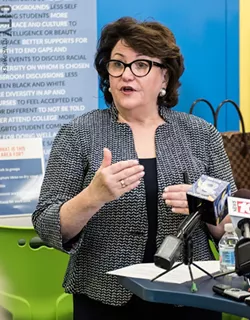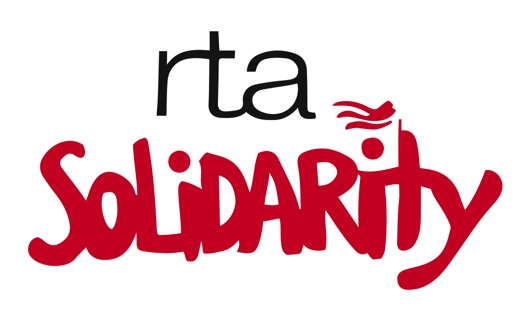By Tim Louis Macaluso Since late last fall, Rochester’s school board and district administrators have been working on a plan outlining how they’ll correct the district’s management and governance problems. State Education Commissioner MaryEllen Elia rejected their first plan and gave them until June 6 to write a new one.
Sometime in the last few months, apparently convinced that district officials can’t fix the problems themselves, state officials began developing a plan of their own. An exchange of emails obtained by CITY shows that state education officials drafted a plan to replace the Rochester school board with a state-appointed board for at least five years.
click to enlarge

- PHOTO BY JACOB WALSH
- State Education Commissioner MaryEllen Elia.
At the end of the five years, the district’s governance would return to an elected board. Under the plan, Rochester’s superintendent would report to Elia until a new board, appointed by New York State Regents, could be created.
The state officials’ plan is a result of concerns that continue to build about the district’s problems, especially with its leadership. For their solution to take effect, though, requires action by the state legislature. In New York State, only the legislature can remove elected school boards. And legislature action isn’t at all certain, at least not soon.
For one thing, the current legislative session ends on June 19, and the next one begins in January 2020. In addition, the proposal to remove the elected school board has already generated opposition from some the board, some community members, and the teachers union. And local Assembly member Harry Bronson says he opposes it.
A “framework” for the plan was outlined in a May 16 email from state Regent T. Andrew Brown to Regent Wade Norwood; Warren Administration Chief of Staff Alex Yudelson; State Education Commissioner MaryEllen Elia; Sean Hart, communications director for Representative Joe Morelle; Rochester Teachers Association President Adam Urbanski; and Chancellor Betty Rosa.
The email apparently followed several discussions among the officials about the district’s future. “SED and the Regents continue to be very concerned with the state of affairs in the RCSD,” Brown wrote, “and have been busy refining the position statement that ended our last conversation. Since our meeting, our concerns have only grown.”
“We believe this action is necessary to bring about real change, and put the interest of kids first,” Brown’s email says.
A later email from Yudelson to Brown says: “Mayor Warren is good with this approach and ready to be supportive however she can.”
In a lengthy interview last week, Warren said the plan originated with the commissioner and the regents, and not with her. But she vigorously defended their efforts, arguing that they are trying to do what’s best for children. Warren has been saying the Rochester school system is broken for several months.
“I think what the commissioner was doing was stepping in to fix it,” Warren said. “I’m not an educator. I can’t fix it from City Hall.”
Warren has repeatedly said she’s not interested in mayoral control, another option in governance of the district. Her predecessor, Bob Duffy, had pushed for mayoral control, and his predecessor, Bill Johnson, had pushed for other reforms, but they weren’t successful, Warren noted.
State education officials need the freedom to act, and legislators need to step up and help them, Warren said.
“What I think they’re trying to do is get to the heart of the issue,” she said, referring to Elia and the regents, “and they need to be able to do whatever they need to do without any political influence.”
Elia has said for nearly a year that the district needs major changes. Her first step was sending Jaime Aquino to Rochester as Distinguished Educator to evaluate the district. His extremely critical report outlined multiple problems and recommended improvements, but whether the school board and the district could implement those changes has been in doubt. Among Aquino’s findings: board members don’t work as a unified body, and some members interfere with adminsitrator’s actions.
Elia didn’t respond to a request for comments about the emails. But a spokesperson for the State Education Department and the regents issued a statement that echoes many of Elia’s earlier comments:
“As we have said over the past several months, we are extremely concerned with the dire situation at the Rochester City School District. We are having conversations with state and local elected officials, union officials, and community leaders to determine the best path forward to improve teaching and learning for all students. No decisions have been made and all options continue to be on the table. One thing is clear, the status quo cannot continue. To do so would be a disservice to Rochester’s children.”
While state officials, Warren, and many local community leaders have been calling for change in the district’s governance, none of them had identified what that change should look like until now.
Unless there’s widespread local support for the plan to remove the board, however, it faces stiff obstacles in the state legislature. Multiple sources say the plan is dead because the teachers’ unions oppose it. Assembly member Harry Bronson, who represents part of Rochester, said late last week that he is considering drafting legislation that would better define the role of the school board and the superintendent in an effort to address the governance issue.
The superintendent should be able to manage the district without interference from the board, Bronson said.
“The approach I would like to take is to look at the Distinguished Educator’s report,” Bronson said. “He put together a roadmap that will help us take steps toward improvements.”
Bronson said he supports creating more community schools like School 17, which offers health care and other services for the students, their families, and the neighborhood.
Also opposed to the plan: Rochester Teachers Association President Adam Urbanski, who said he attended one meeting with Elia and the Regents during the recent discussions about the Rochester district’s future.
“I want to be crystal clear,” Urbanski said in a phone interview last week. “I never supported a state takeover then, I don’t support it now, and I never will,” he said. He is also against mayoral control, he said. But much like Bronson, he is open to some type of legislation that clearly defines the board’s role, to “prevent it from usurping the right of the superintendent to manage the district,” he said.
“If any legislation is promoted,” Urbanski said, it should not overreach and deny the citizens’ ability to elect the officials that they want representing them on the school board.”
School board President Van White said he hadn’t known about the meetings or the plan and hadn’t seen the emails. But he said the timing for their plan is wrong.
“The board and the administration have been working feverishly to revise our plan for improving the district to meet Commissioner Elia’s June 6 deadline,” White said. “We’re doing exactly what she instructed us to do. It’s an enormous effort at a critical time, because we also have to be focused on preparing our kids for exams and making sure they graduate. That’s where my focus is.”
Legislation to remove the board has other complications. For instance: The school board has just hired a new superintendent, Fairfax County, Virginia, administrator Terry Dade. He’s supposed to start work here in early July, just over a month from now. If the legislature puts the state in charge of the district, how does that change affect him?
There’s also a primary election on June 25 and a general election in November. In the primary, 10 Democrats are running for four school board seats. Will Rochester voters be choosing a board that soon won’t exist?
Opponents of a state takeover also argue that removing an elected school board takes rights away from voters and thus isn’t democratic. Proponents argue that Rochester school board elections aren’t very democratic, since very few people vote in them.
In the interview last week, Warren said politics needs to be put aside for the good of Rochester’s children, but removing politics from public education is virtually impossible. Still, Warren said, the public needs to give state legislators and state education officials a chance to “do something instead of nothing” to fix the Rochester school system.
“We’ve got children who are in prison now because of a failed education system,” Warren said. “We’ve got people who make a decision to leave this city every year because of the education system.”
“We’ve tried to fix it, and it’s obviously something we can’t fix on our own,” she said.
This story’s original link : https://www.rochestercitynewspaper.com/rochester/fight-brews-over-school-governance/Content?oid=10344326
